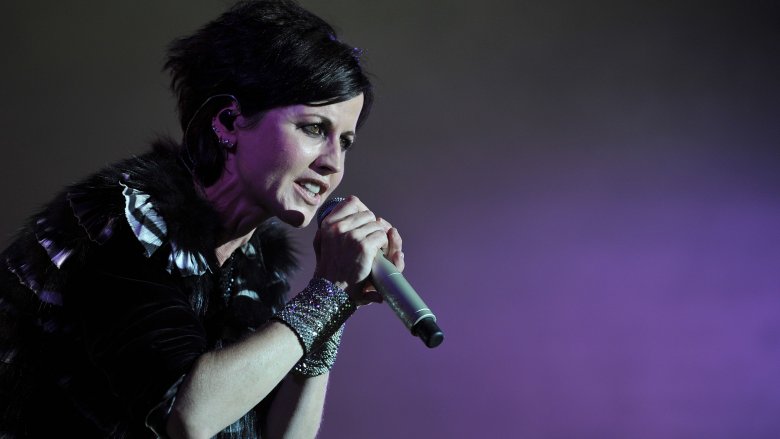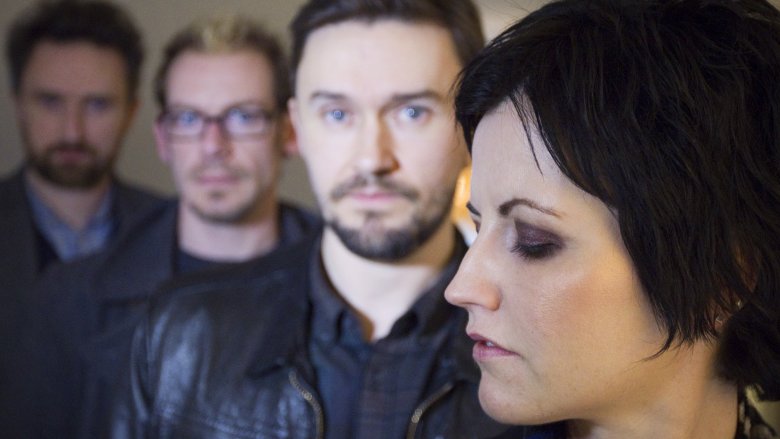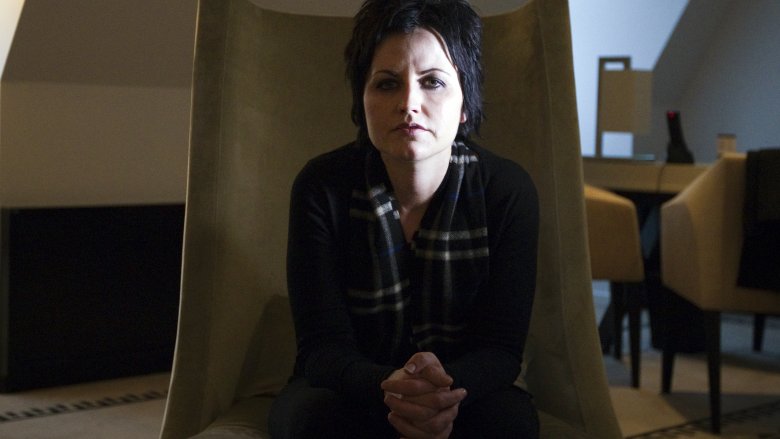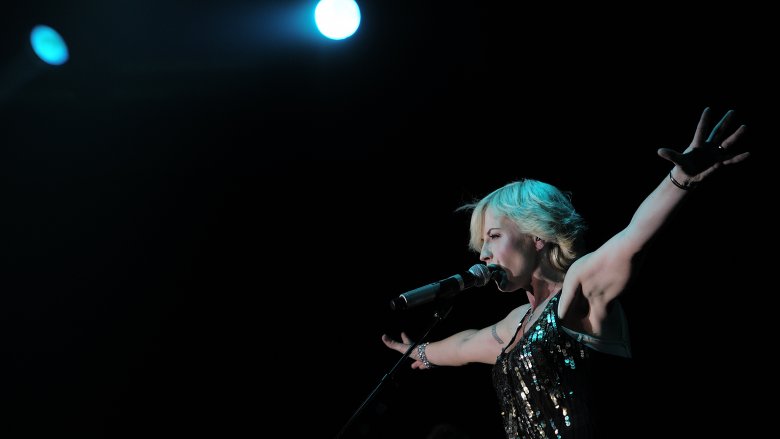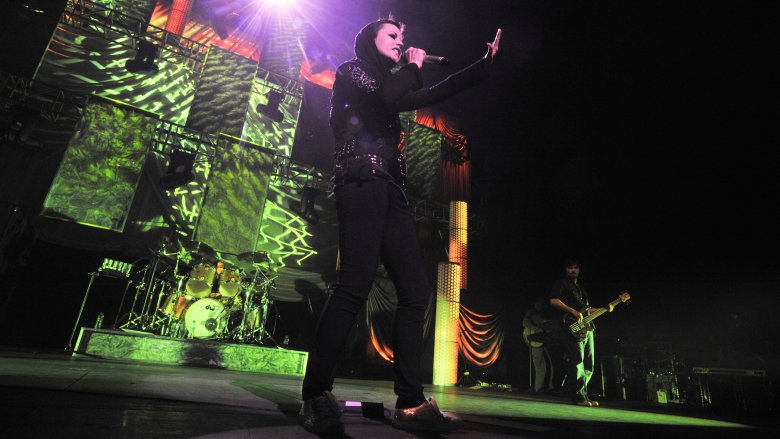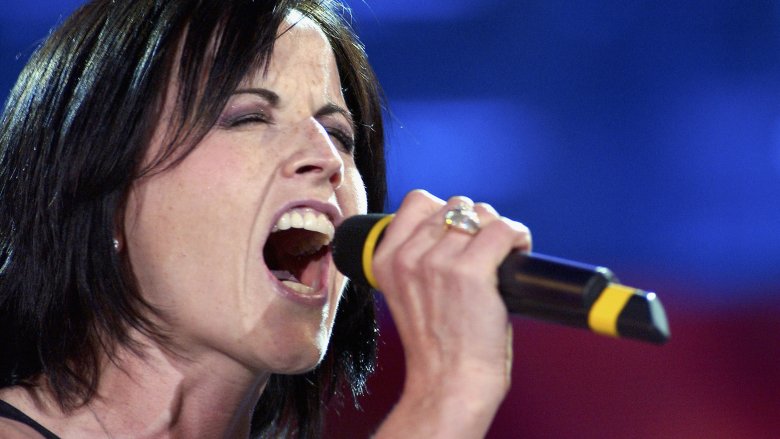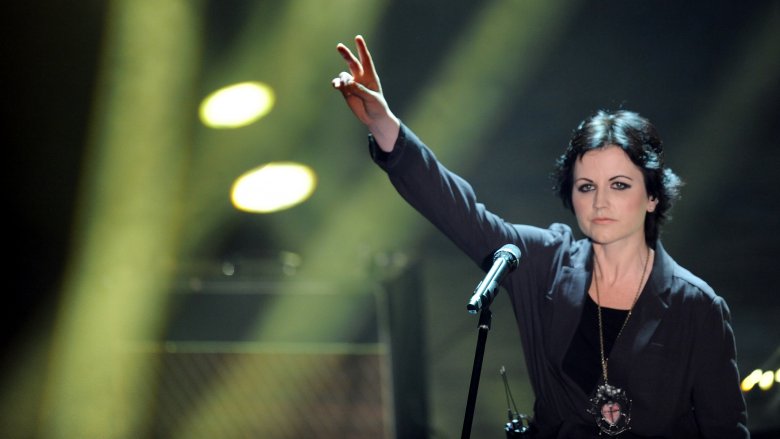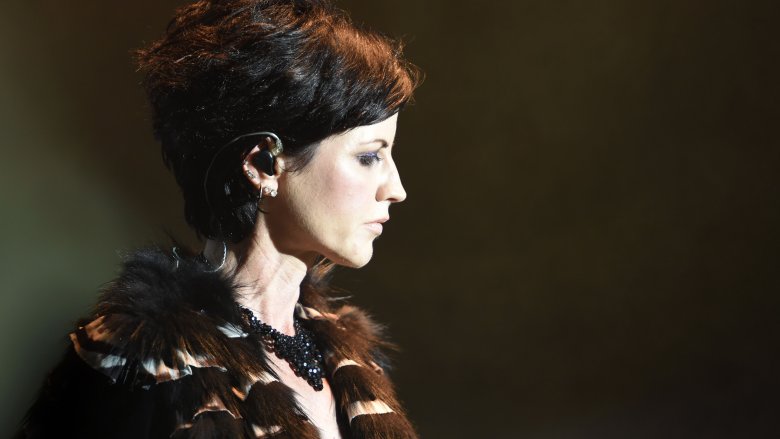The Untold Truth Of The Cranberries' Lead Singer Dolores O'Riordan
The world was shocked by the announcement of the death of The Cranberries' lead singer Dolores O'Riordan on January 15, 2018. It wasn't until the following day that news outlets like The Irish Independent reported that police ruled her untimely death not suspicious, leaving family, friends, and millions of fans to mourn the singer-songwriter who had been the heart, soul, and soundtrack of a generation. You know her voice, you know her songs, so let's take a look at what you might not know about her and the legacy she left behind.
She was originally uncomfortable being watched
What were you doing when you were 19 years old? When she was 19, O'Riordan and The Cranberries were already touring the world and performing in venues packed with fans. That's a lot to process at any age, and it's almost unimaginable for someone who's still a teenager.
At first, it was too much. When she talked to The Independent in 2009, she could slow down and look at her rise to fame though a different lens. She said some of her difficulties came from achieving too much too young, but some came because she was so uncomfortable being watched.
True, O'Riordan had been performing for years by the time she stepped onto the world stage. But most of those early performances were in traditional Irish settings, where the attitude toward music is very different. "People don't look at you singing," she said. "They go within themselves and listen. Music is about listening, not looking." By the time she was 23, she said she "went nuts for a while," feeling like everyone was watching all the time. She didn't like it.
She once bonded with Princess Diana over the cost of fame
While you might not be able to imagine two women more different than Dolores O'Riordan and Princess Diana, they actually bonded quite a bit when they met. O'Riordan talked about the meeting in an interview with The Irish Independent, and said they were introduced after she performed at a 1995 charity concert. She did Ave Maria with Pavarotti, and at the dinner after, she ended up sitting with the princess and having a few glasses of wine. Diana explained why she cried during the song — it was one of her mother's favorites — then met O'Riordan's parents and asked them all about their Limerick roots.
O'Riordan admired her — "Being a princess is much harder than being a female rock star!" — but she said Diana returned the sentiment with an appreciation of how hard it was to be a rock star with the travel schedule. If only the two could have formed a power duo.
She spoke out about the abuse she suffered as a child
In 2014, O'Riordan's friend Barry Egan wrote a piece for the Belfast Telegraph that tried to explain what happened to her and her career, and why she found herself in such a nightmarish place. She had confessed her demons a year earlier, finally talking about a dark part of her childhood. Egan wrote: "She told me this in October 2013: 'For four years, when I was a little girl I was sexually abused. I was only a kid.'"
The abuse — which she openly detailed — happened between ages 8 and 12, and although she declined to name names, she said he was someone in a position of trust in Limerick. Egan wrote she kept it buried for a long time but the secret came back in 2011, when her father lost his seven-year battle with cancer. For months before his death, she dreamed about coming face-to-face with her abuser at his funeral — and she did.
She said he apologized for what he did to her, but words don't make years of pain go away. "You think it is your own fault," she said. "I buried it. ... You bury it because you are ashamed of it. You think: 'Oh my God. How horrible and disgusting I am.'" When O'Riordan did speak out about what happened, she was praised by the Rape Crisis Centre for the strength she showed in speaking out and encouraging others to do the same (via The Irish Independent).
She preferred the rural Irish countryside to any rock-star life
O'Riordan may have had the world at her feet, but she was always a country girl at heart. When she talked to The Telegraph in 2001, she said she found her peace in rural Ireland. She described her "most cozy, loving childhood," the closeness she shared with her mother, and her thoughts on the rock star life.
"I don't want to be a part of the Hollywood scene, or the New York scene — I just want to be a part of my family scene," she said. "I don't want to get into a clique of people that I suddenly feel I have to have an identity with. I have a real identity with a beautiful family I really know and really love."
She talked about her piece of paradise, too, a house outside Limerick with a cottage for her mother, a handful of horses (and a Connemara pony for the kids), a pot-bellied pig, a flock of chickens, some Irish wolfhounds and English sheepdogs, and the peacocks they raised. For her, the ideal was a fire burning in the cottage fireplace, the kids coming in with kittens they found, and her father bringing the duck over to visit.
She was open about her mental health
All too often, we see celebrities standing on the pedestals their fans put them on, and we think they must have it made. But O'Riordan broke the mold there, too, and spoke openly about her own struggles and her own mental health.
When she talked to Barry Egan (via the Belfast Telegraph), she told him about not just the abuse she suffered as a child, but the impact it had on her as an adult. At the same time she struggled to come to terms with the newfound fame of The Cranberries, she fought to manage the depression that led her to suicidal thoughts, anorexia, insomnia, and panic attacks. It all culminated in a nervous breakdown, but in 2013, she said she was well on her way to becoming "better and stronger."
"I knew why I hated myself," she told Egan. "I knew why I loathed myself. I knew why I wanted to make myself disappear. ... I think I am getting stronger for sure. But I'll always be a bit of a train wreck. Nobody's perfect. Those people who pretend they are perfect aren't perfect." She also added that binge drinking was her biggest problem at the time, and that she turned to the bottle when the memories were too much and she couldn't control them. She had boundaries in place even then: no sleeping tablets with alcohol.
She was committed to psychiatric care after a 2014 meltdown
In 2015, The Irish Times reported O'Riordan pleaded guilty to charges filed after a 2014 incident that started on an Aer Lingus flight into Shannon and continued at the airport. Those charges focused on O'Riordan's altercation with Garda officers who were called to the scene, and included accusations that she hit and spit on officers, one of whom later said the whole incident was "one of the worst I have ever had to deal with."
That was followed up in 2017 by another lawsuit, this one filed by the Aer Lingus flight attendant O'Riordan injured aboard the flight (via The Irish Independent). That's the story most people heard, but when her mother spoke to the Limerick Leader (via The Journal) in 2014, she said there was more to the story. Eileen O'Riordan confirmed it wasn't drugs or even alcohol that triggered her daughter's outburst, but stress from the end of her 20-year marriage. She said her daughter didn't even recognize her when she first saw her, and she was lying on the floor "trying to protect herself." O'Riordan was later placed in psychiatric care, and the 2015 case against her ended with no criminal convictions and a €6,000 payment to the poor box. (In Ireland, people can sometimes donate to charity in lieu of a sentence).
John Lennon was her childhood hero
When Rolling Stone talked to O'Riordan way back in 1995, The Cranberries star was on the rise. On stage, she seemed to have it all together, but even then she made it clear she didn't appreciate the invasion of privacy that went along with fame.
However, she did say she was inspired by Ireland's long musical traditions, as well as her childhood hero John Lennon — for a bit of an odd reason. "I thought the Beatles were nice boys who wrote nice songs," she said. "Whereas John Lennon actually got himself in a fair bit of hassle there and again. When he left the band, he didn't do anything for anybody but himself. He got totally into being a daddy, he wrote songs about his son ... and about Yoko."
She helped open debate about abortion
It's no secret that artists can be particular about what movies and television shows their music is used in, and in 2009, The Cranberries allowed their music to be used in a movie called South Dakota: A Woman's Right to Choose. The film was part documentary and part feature, and told the story of two pregnant teens and the decisions they made. O'Riordan did more than just agree to let them use the music; she also moderated a post-screening panel that involved hundreds of teenage girls where she invited them to share their thoughts and feelings on the issue of abortion.
When the Los Angeles Times covered the panel, they said O'Riordan stayed neutral while encouraging the girls to speak up about how they felt without fear of being judged. "Don't be shy," she told them. "Totally say what you think. It's your life, it's your future." She — and director Bruce Isacson — said it was more about opening a discussion than changing minds, and it wasn't the first time she talked about the issue. In a 1995 interview, Rolling Stone quoted her slightly less neutral comments: "I'm in no position to judge other women, you know? But, I mean, 'Idiot — why didn't you not get pregnant?' It's not good for women to go through the procedure. ... It belittles women."
She was vocal about her brand of feminism
O'Riordan was outspoken on her views of other women, too. She believed in a very particular kind of feminism, and she talked to The Irish Independent about it in 2014. She was a mentor on The Voice of Ireland at the time, and took the opportunity to clarify comments she previously made that seemed to suggest she didn't get along with the show's other female mentor, Jamelia.
"I'm a feminist, and she's not," O'Riordan stated. "Someone who uses their sexuality to be heard or to be seen or get attention — I don't think you need to do that. I think women should be equal."
At one point, she even denied being any kind of feminist at all. The Telegraph quoted her as once saying, "I think the feminists probably need some serious man in their lives." She added that while she liked the security of having men in her life (including her five brothers), she always made it quite clear she did what she wanted, when she wanted, because she wanted, and never felt the need to impress anyone with anything but her soul.
She was open about her suicidal thoughts
O'Riordan never shied away from the tough topics, and she spoke openly about her own experiences with suicidal thoughts. When she spoke with Barry Egan and the Belfast Telegraph in 2014, both she and her mother remembered her going home in 1993 and asking for help when the building pressure and rising fame — coupled with the demons in her past — quickly became too much for her to bear.
"You get to the point where you want to die," she said, "because you think that you'll get peace when you're dead and you can't get any worse than you are."
She also shared the heartbreaking fact that things got so bad for her in 2012 that she tried to overdose. When that failed, she reassessed her life. "I suppose I am meant to stay here for the kids," she said. "It is just about acknowledgement for me now — not revenge."
O'Riordan also acknowledged how her self-professed obsession with death and mortality helped shape her work when she talked to Songwriting in 2017. She said those two things were among the places she looked for inspiration, and said, "I wake up in the morning and I'm feeling anguish, I feel terrible and I don't know why. I wake up and look out and think, 'Oh God, how do I get through another day?!'"
She always kept her Catholic faith
O'Riordan frequently talked about the values instilled in her during her childhood, which The Telegraph called "old-fashioned, romantic, and Catholic." O'Riordan herself told The Irish Independent, "I believe in God, and life after death. I believe in other dimensions. When people die they go to another dimension and we can communicate with them."
She said part of her belief in life after death came from her experience saying goodbye to her father, and added he regularly came to her in dreams, where she spoke with him. "I miss him terribly but I learned to let go — not just for myself, but for him also."
After she performed at the Vatican's Christmas concert in 2013, she spoke more to The Irish Independent, and acknowledged her religious beliefs were perhaps a bit non-traditional. "A lot of the stuff I learnt, I take with me today — that we should let each other be ourselves." Even so, she was thrilled to visit the Vatican and to meet the pope. She took her mother to meet him, too.
She said she could die proud of what she's done
Each and every one of us — no matter how much money we have or how many people know our name — is eventually faced with our own mortality. It's a reckoning we all have to make on our own, and it's not surprising O'Riordan had her own thoughts on her life and what she would leave behind upon her death.
When she talked to The Telegraph about her legacy, it was one she was proud of. "When I die, I'll have a massive catalog of beautiful songs behind me," she told them. "I'm proud I wrote Linger, I'm proud I wrote Dreams. I love it when I hear people doing cover versions of my songs: I'm like, 'I wrote that! My God!' I'm so proud of myself."
And that's all any of us can hope for.
